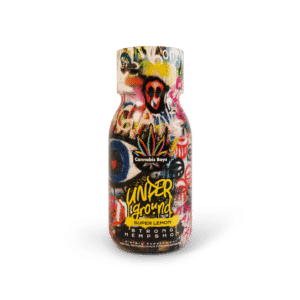The endocannabinoid system (ECS) plays an important role in the pathophysiology of psychotic disorders. Hemp cannabinoids have the ability to regulate the functioning of this system, which is why the potential antipsychotic properties of CBD are the subject of scientific research in many research centers around the world. Scientists pay attention to various types and stages of psychotic disorders (including schizophrenia). They are checking the potential benefits of using CBD also in people who experience psychotic episodes in the course of other diseases, e.g. Parkinson's disease. Let's look at selected research results.
What are psychotic disorders?
The chapter "Schizophrenia spectrum disorders and other psychotic disorders" of DSM-5 describes as many as 12 types of disorders that may have different intensity or be at different stages. However, they have many features in common. Psychosis or a psychotic state is understood as a state of disruption of various areas of mental functioning, including: perception of reality – oneself and the surroundings, way of thinking, experiencing and expressing emotions, mood.
Psychotic disorders manifest themselves in the areas of consciousness, thinking, perception and behavior. The sick person does not notice that his or her way of thinking is inconsistent with reality or illogical, and is unable to critically look at his or her behavior.
Symptoms characteristic of psychotic disorders:
- hallucinations, hallucinations, delusions,
- thinking disorders: slow thinking, distraction, irrationality,
- indifference and lack of energy or severe agitation,
- behavioral disorders:
ambivalence – contradiction of statements and behavior,
ambitiousness – contradictory behavior,
paramimia – contradiction of facial expressions with experienced emotions,
- antisociality.
Depending on the type of disorder , some symptoms may be more severe than others, some may not be present at all, or may not occur at the same time as others. Psychotic disorders may involve, to a greater extent, perception disorders - hallucinations or thinking disorders - abnormalities related to the course and way of thinking.
CBD in the treatment of psychosis
Antipsychotic drugs available on the market have the same mechanism of action - they block dopamine receptors. This means that there are not many alternatives available for people who do not respond to such treatment. At the same time, these drugs often cause side effects, which makes some patients reluctant to take them. This is a particular problem in the early stages of psychosis, when unpleasant experiences may influence patients' future attitude towards treatment. However, no preventive treatment is available for people at clinically high risk of psychosis.
Studies have shown that CBD has a different mechanism of action (independent of the dopamine receptor) and therefore may constitute a completely new class of antipsychotic drugs. The greatest benefit is the lack of some side effects, e.g. muscle stiffness, muscle tremors, walking disorders and increased prolactin levels. Scientists also point out that cannabidiol may increase the effectiveness of antipsychotic drugs if used in parallel.
So far, evidence for the antipsychotic effects of CBD comes from preclinical studies in animals, studies using neuroimaging methods, studies involving healthy volunteers, and relatively small clinical studies involving people with psychotic disorders.
One trial involved 88 people suffering from schizophrenia. After 6 weeks of treatment, compared to the placebo group, the intensity of psychotic symptoms was lower in the CBD group. The patients' condition was more often assessed as "improved" by doctors. CBD was well tolerated, and the incidence of side effects was similar between the CBD and placebo groups.
CBD may alleviate psychotic symptoms in Parkinson's disease
Psychotic symptoms may also appear in people with Parkinson's disease. A study conducted on patients showed significant relief of symptoms as a result of cannabidiol treatment. CBD did not worsen motor function and did not reduce total scores on the Unified Parkinson's Disease Rating Scale. No side effects were observed during treatment. These preliminary data suggest that CBD may be effective, safe, and well-tolerated in the treatment of psychosis in Parkinson's disease.
CBD in psychosis – large clinical trials
trial will begin in 2023, covering three groups: people who have had their first psychotic episode, people who are at high risk of developing psychosis, and people with psychosis who do not respond to conventional treatment. In total, there will be 1,000 patients, the study will cover 35 research centers, mainly in Europe and North America.
According to scientists, cannabidiol is one of the most promising new treatments for people suffering from psychosis. This study will be the first to evaluate CBD in a large number of people with psychosis or psychotic symptoms, and brings together many of the leading centers working around the world in this field. In addition to treating already diagnosed psychosis, the study will also check whether cannabidiol can prevent the occurrence of psychosis in people at high risk of developing it.
The CBD that will be used in the study comes from cannabis. The drug consists of over 99% cannabidiol. Other components of cannabis that may have adverse (in this case) psychoactive effects have been removed. The study will use a licensed form of cannabidiol, known as Epidyolex. Scientists emphasize that the great advantage of CBD over conventional antipsychotic drugs is the lack of serious side effects.
Scientists also aim to identify biomarkers - biological signposts - that would indicate that a patient may respond well to treatment. This will allow for a better understanding of how CBD works in psychosis and the possibility of its greater personalization in the future.
The studies used high doses of CBD (from 300 to 1,500 mg per day), and the participants were under constant observation by scientists and doctors. Taking such large doses on your own is not a good idea. For your own safety, it is better to consult a cannabis therapy doctor.
Sources:
- https://www.ox.ac.uk/news/2023-02-16-major-trials-test-effectiveness-cannabidiol-psychosis
- https://www.mdpi.com/2077-0383/8/7/1058
- https://journals.sagepub.com/doi/abs/10.1177/0269881108096519
- https://link.springer.com/article/10.1007/s00213-021-05905-9
- https://edraurban.pl/ssl/book-sample-file/zaburzenia-nalezace-do-spektrum-schizofrenii-i-inne-zaburzenia-psychotyczne-dsm-5-selections/pdf/schizofrenia_dsm-5.pdf
- https://journals.sagepub.com/doi/full/10.1177/2045125319881916#bibr25-2045125319881916









[…] THC with anxiety is nothing new. In the scientific literature, you can find both studies showing the anxiolytic effect of THC, as well as those describing the intensification of anxiety symptoms in people using this […]
[…] methodologically planned research on the use of small doses of psychedelics. Conclusions about the effects of low doses are sometimes drawn on the basis of clinical studies in which full psychoactive doses were used, which is not necessarily […]
[…] A vaporizer works by heating cannabis products to a temperature lower than the combustion point, but high enough to extract the desired cannabinoids and terpenes from the plant. This process produces vapor containing active ingredients that can be inhaled. […]
[…] CBD effectively inhibits the action of microorganisms. It unblocks the sinuses and protects against nasal congestion, thus also relieving pain and preventing hemorrhages. […]
[…] a chemical compound found in the cannabis plant. Research has been conducted for years on its effects on humans and the potential use of the substance in the treatment of diseases and […]
[…] scientific articles reporting research on the effects of CBD and other hemp substances on sleep disorders and insomnia conclude that researchers are […]
[...] is growing, and research is increasingly entering the clinical phase, allowing the observation of the effects of cannabis-based drugs on patients and determining the most effective dosage of cannabinoids and the method [...]
[…] Research on CBD and sleep is still in its early stages, but there is promising evidence that it can help people sleep better. One study involving people with insomnia found that taking 25 mg of CBD daily helped them fall asleep and stay asleep longer than those who took a placebo. […]
[…] CBD has a strong anti-inflammatory effect, which relieves inflammation caused by endometriosis. Living in constant pain also leads to anxiety disorders, which CBD also deals with. […]
[…] while research on the benefits of CBD numbers in the thousands, CBG has only recently received attention from the medical community, so its benefits […]
[…] that people feel more stressed. This may be due to the potential biphasic effect of cannabis, where a substance (such as THC) can produce opposite effects - depending on […]
[…] The blood pressure-lowering effect of CBD was mainly observed under stressful conditions. Additionally, many positive effects of CBD have been observed in experimental models: […]